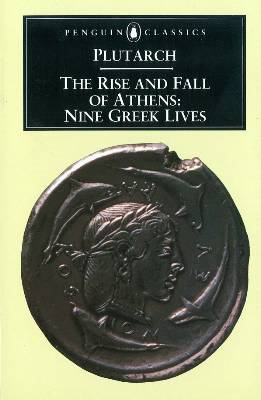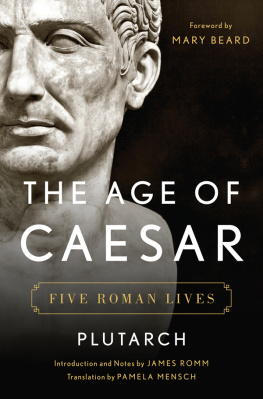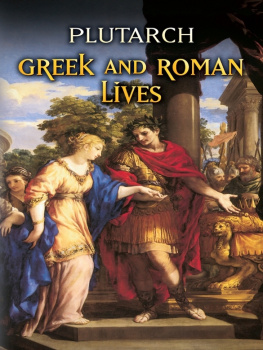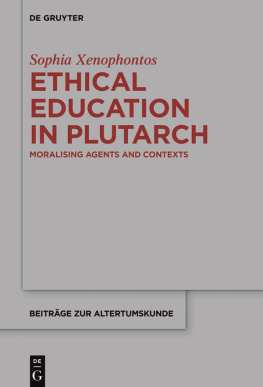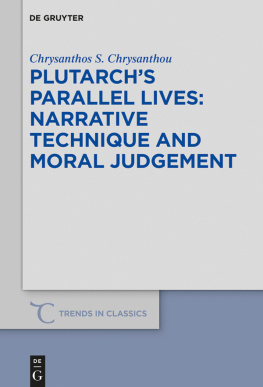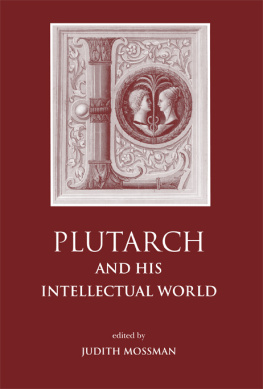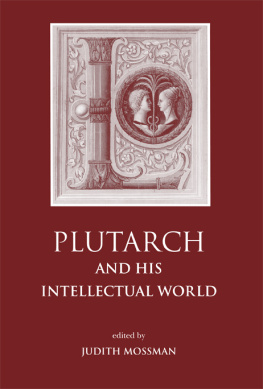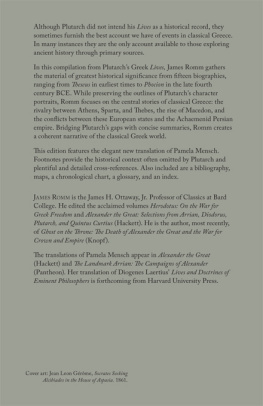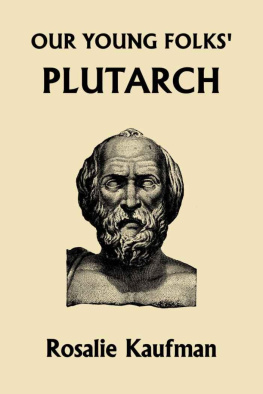Plutarch - Plutarchs Lives (Volume 11)
Here you can read online Plutarch - Plutarchs Lives (Volume 11) full text of the book (entire story) in english for free. Download pdf and epub, get meaning, cover and reviews about this ebook. year: 2009, publisher: Cambridge Scholars Publishing, genre: Science. Description of the work, (preface) as well as reviews are available. Best literature library LitArk.com created for fans of good reading and offers a wide selection of genres:
Romance novel
Science fiction
Adventure
Detective
Science
History
Home and family
Prose
Art
Politics
Computer
Non-fiction
Religion
Business
Children
Humor
Choose a favorite category and find really read worthwhile books. Enjoy immersion in the world of imagination, feel the emotions of the characters or learn something new for yourself, make an fascinating discovery.

Plutarchs Lives (Volume 11): summary, description and annotation
We offer to read an annotation, description, summary or preface (depends on what the author of the book "Plutarchs Lives (Volume 11)" wrote himself). If you haven't found the necessary information about the book — write in the comments, we will try to find it.
Plutarchs Lives (Volume 11) — read online for free the complete book (whole text) full work
Below is the text of the book, divided by pages. System saving the place of the last page read, allows you to conveniently read the book "Plutarchs Lives (Volume 11)" online for free, without having to search again every time where you left off. Put a bookmark, and you can go to the page where you finished reading at any time.
Font size:
Interval:
Bookmark:

This is a digital copy of a book that was preserved for generations on library shelves before it was carefully scanned by Google as part of a project to make the world's books discoverable online. See the back of the book for detailed information.
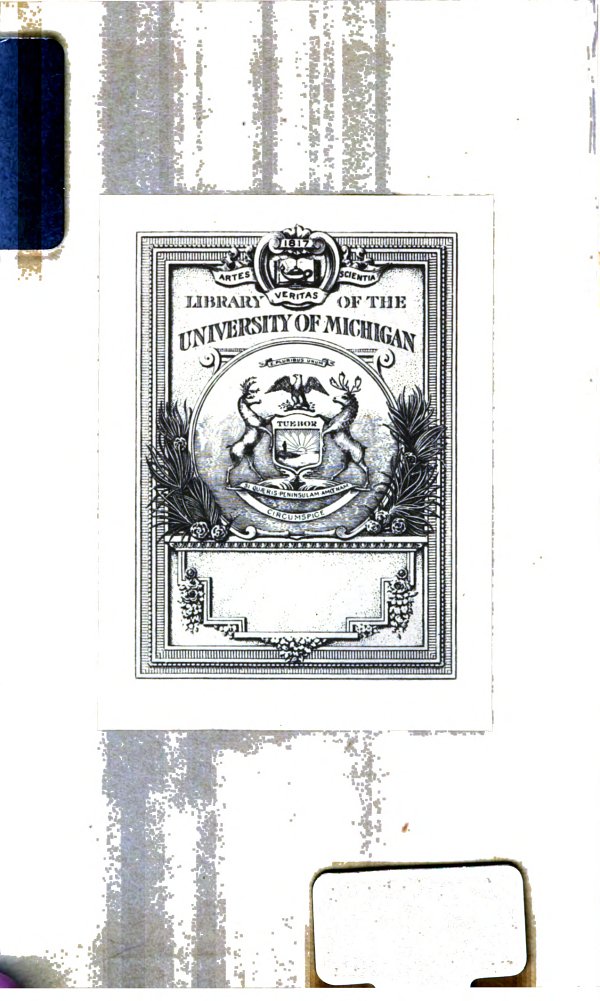


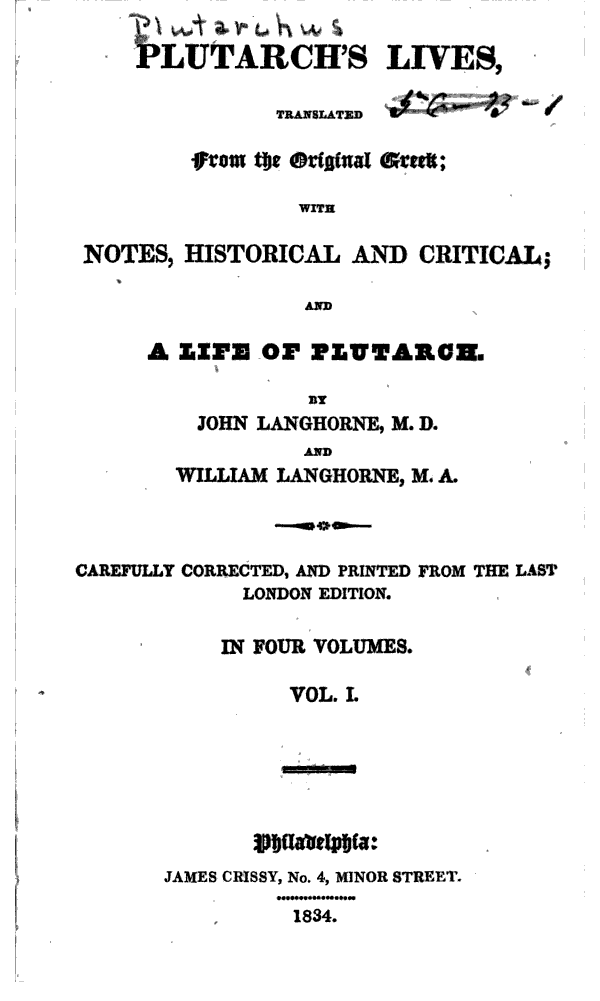

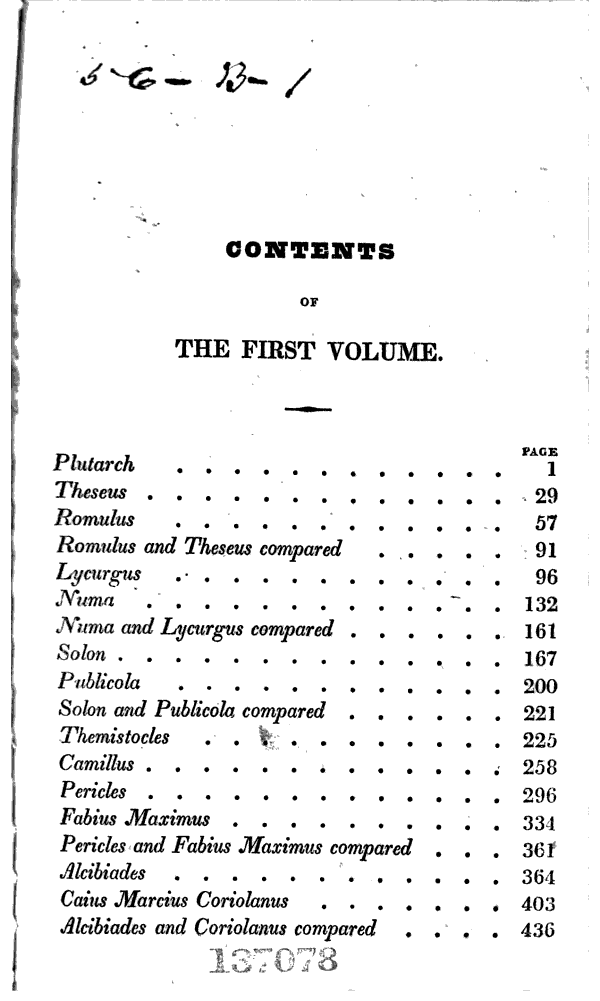

TO THE RIGHT HONOURABLE
LORD FOLKESTONE.
MY LORD,
The style and genius of dedications, in general, have neither done honour to the patron nor to the author. Sensible of this, we intended to have published a work, which has been the labour of years, without the usual mode of soliciting protection. An accident has brought us into the number of dedicators. Had not you accompanied your noble father to our humble retreat, we should still have been unacquainted with your growing virtues,your extraordinary erudition, and perfect knowledge of the Greek language and learning; and Plutarch would have remained as he did in his retirement at Chaeronea, where he sought no patronage but in the bosom of philosophy.
Accept, my Lord, this honest token of respect, from men, who, equally independent and unam bitious, wish only for the countenance of genius and friendship. Praise, my Lord, is the usual language of dedications: But will our praise be of value to you ?Will any praise be of value to you, but that of your own heart? Follow the example of the Earl Of Radnor, your illustrious falher. Like him maintain that temperate spirit of policy, which consults the dignity of government, while it supports the liberty of the subject. But we put into your hands the best of political preceptors,a preceptor who trained to virtue lhe greatest monarch upon earth; and, by giving happiness to the world, enjoyed a pleasure sometiling like that of the Benevolent Being who created it. We are, My Lord,
Your Lordship's
Most obedient, and
Very humble Servants,
J. & W. LANGHORNE
PREFACE.
If the merit of a work may be estimated from the universality of its reception, Plutarch's Lives have a claim to the first honours of literature. No book has been more generally sought after, or read with greater avidity. It was one of the first that were brought out of the retreats of the learned, and translated into the modern languages. Amiot, Abbe of Bellozane, published a French translation of it in the reign of Henry II.; and from that work it was translated into English, in the time of queen Elizabeth.
It is said by those who are not willing to allow Shakspeare much learning, that he availed himself of the last-mentioned translation; but they seem to forget, that, in order to support their arguments of this kind, it is necessary for them to prove that Plato, too, was translated into English at the same time; for the celebrated soliloquy, " To be, or not to be," is taken, almost verbatim, from that philosopher; yet we have never found that Plato was translated in those times.
Amiot was a man of great industry and considerable learning. He sought diligently in the libraries of Rome and Venice for those Lives of Plutarch which are lost; and though his search was unsuccessful, it had this good effect, that, by meeting with a variety of manuscripts, and comparing them with the printed copies, he was enabled, in many places, to rectify the text. This was a very essential circumstance; for few ancient writers had suffered more than Plutarch from the carelessness of printers and transcribers; and, with all his merit, it was his fate, for a long time, to find no able restorer. The schoolmen despised his Greek, because it had not the purity of Xenophon, nor the Attic terseness of Aristophanes; and, on that account, very unreasonably bestowed their labours on those that wanted them less. Amiot's translalion was published in the year 1558; but no reputable edition of the Greek text of Plutarch appeared till that of Paris in 1624. The abovementioned translation, however, though drawn iVom an imperfect text, passed through many editions, and was still read, till Dacier, under better Mispices, and in better times, attempted a new one, which he executed with great elegance, and toleiable accuracy. The text he followed was not so correct as might have been wished; for the London edition of Plutarch was not then published. However, the French language being at that time in gieat perfection, and the fashionable language of almost every court in Europe, Dacier's translation came not only into the libraries, but into the hands of men. Plutarch was universally read, and no book in thdiSfe times had a more extensive sale, or went through a greater number of impressions. The translator had, indeed, acquitted himself in one respect with great happiness. His book was not found to be French Greek. He had carefully followed that rule, which no translator ought ever to lose sight of, the great rule of humouring the genius, and maintaining the structure of his.own language. For this purpose he frequently broke the long and embarrassed periods of the Greek; and by dividing and shortening them in his transla tion, he gave them greater perspicuity, and a more easy movement. Yet still he was faithful to his original; and where he did not mistake him, which, indeed, he seldom did, conveyed his ideas with clearness, though not without verbosity. His translation had another distinguished advantage. He enriched it with a variety of explanatory notes. There are so many readers who have no competent acquaintance with the customs of antiquity, the laws of the ancient states, the ceremonies of their religion, and the remoter and minuter parts of their history and genealogy, that to have an account of these matters ever before the eye, and to travel with a guide who is ready to describe to us every object we are unacquainted with, is a privilege equally convenient and agreeable. But here the annotator ought to have stopped. Satisfied with removing the difficulties usually arising in the circumstances above-mentioned, he should not have swelled his pages with idle declamations on trite morals, and obvious sentiments. Amiot's margins, indeed, are every where crowded with such. In those times they followed the method of the old divines, which was to make practical improvements of every matter; but it is somewhat strange that Dacier, who wrote in a more enlightened age, should fall into that beaten track of insipid moralizing, and be at pains to say what every one must know. Perhaps, as the commentator of Plutarch, he considered himself as a kind of travelling companion to the reader; and, agreeably to the manners of his country, he meant to show his politeness by never holding his peace. The apology he makes for deducing and detailing these flat precepts, is the view of instructing younger minds. He had not philosophy enough to consider, that to anticipate the conclusions of such minds, in their pursuit
Font size:
Interval:
Bookmark:
Similar books «Plutarchs Lives (Volume 11)»
Look at similar books to Plutarchs Lives (Volume 11). We have selected literature similar in name and meaning in the hope of providing readers with more options to find new, interesting, not yet read works.
Discussion, reviews of the book Plutarchs Lives (Volume 11) and just readers' own opinions. Leave your comments, write what you think about the work, its meaning or the main characters. Specify what exactly you liked and what you didn't like, and why you think so.




